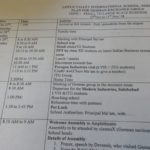In barely two weeks we are going to fly to our partner school in India. This means it is high time to inform the parents of the latest news from Lotus Valley, to hand out the schedule prepared diligently, and to answer the most pressing questions of all participants. Therefore, the German parents, some of the exchange students and me, being the participating teacher will gather at the Johannes-Turmair-Gymnasium this Monday evening.

The most urgent question to answer will certainly be whether we will get our visa in time. Luckily, I got an email this week from the consulate of India in Munich guarantying us the help of the consulate. Thus, I feel more than positive that the visa problems of the last weeks are off the table and that there won’t be any more surprises.
As we also already got our tickets from our travel agent we are theoretically ready to travel, and the meeting is obsolete, isn’t it? That’s a hopeful but somehow naïve wish. The experience of several years of exchange have taught us that there are far more topics to clarify, not only to settle the parents’ worries but also to avoid further misunderstandings.
So, here is my checklist for all the teachers who must conduct such a meeting. I tried to make a list of all the topics that usually arise during the meeting and that I put in my presentation in advance. Please drop a comment if I forgot an issue.
- Travel dates: Which flights? When is the departure and when the arrival? How do we get to the airport? Will there be a bus shuttle and when will it leave the meeting point?The parents need this information not only because they must bring the students and their luggage to the airport/meeting point but usually they want to track the flights online, too.
- Medication: If the students need certain medication on a regular basis they should carry it with them all the time. To avoid unwanted questions from the customs it is important to carry all the pills in the original packages. An additional copy of the prescription helps if the type of medication is unusual. Unfortunately, it can happen that a piece of luggage gets lost. Therefore, it is also clever to split the supply in two halves and to store it in different places.
For the trip to India I always recommend taking some pain killers and some pills against diarrhoea along. Usually you don’t need anything else, because the host parents are well equipped and even homeopathic pharmacies are available in many places. In addition, the teacher always carries some band aids which always come in handy and are often forgotten at home. - Hygiene articles: Most of the young female students are too ashamed to ask the host or the partner where to buy hygiene articles like sanitary towels or tampons. In addition, it can be a little bit confusing in an Indian market to find the right shop to buy these articles. That’s why it is also reasonable to bring these items from Germany.
- Food: No worries. You don’t have to bring your own food. There is quite plenty of it in India!
- Clothing: Depending on the weather you must bring the adequate clothing. Students often pack to much because they don’t know that having your stuff washed in India is a common option. Having that in mind, for a two-week trip to Delhi in November some shorts and shirts for your spare time at home, some sport clothing and some long trousers are enough to pack. An additional single pullover is never a bad idea, too, because the air condition in the plane can be quite chilly.
Please remind the parents of the weight limits of the airline. There shouldn’t be any delays at the airport due to overweight luggage. - Schedule: What will my boy or girl do in India? Of course, parents and students are excited to get to know the details. Therefore, I not only hand out the itinerary, but give small explanations to each date. The parents should get the feeling that the teacher is in control and knows what is going on abroad.
- Presents for the host: It is good manner to bring along some presents. Some chocolate or German gummi bears are always a good Idea. It shouldn’t be too expensive, it should be somehow connected to Germany or the exchange. The ideas are without limit: T-Shirts, mugs, a photo book, pictures, ….
- Money: However, it is possible to change Euro in Rupees in advance I always tell the parents that it is easier to do that in India. If the host parents take care of that they will need the passport of the student. Knowing that little detail changing money shouldn’t be a problem.
Another option is to use a (prepaid) credit card. With your card you can withdraw money from the ATM or use it at the mall. - Electronic equipment: For the students a life without phone is impossible to imagine. Therefore, leaving your mobile at home is without option. Luckily the children won’t need any adapters to charge their phones. The flat EU power plucks can be used in India and the charger takes care of the voltage automatically. The same is true for charging your camera. The only problem could occur if somebody wants to use a hair dryer. The round power plugs would need an adapter but if the participants tell their Indian partners is advance they can prepare one and one can save some weight.
- Ways to contact the student or teacher: Most of the German cell phones work in India and there is no need to buy an extra prepaid mobile abroad. The costs for a phone call however can be fairly high but receiving a text message is usually free of fees. In the afternoon or evening, when the students are at home they in addition can all use the local wifi and can therefore make or receive a gratis phone call to or from their parents or can stay in touch with their family by using WhatsApp.
In case of an emergency students like parents can always call the teacher and therefore they all get his number in the parent-teacher meeting. If it is urgent the costs of a few Euros shouldn’t be an obstacle and if it isn’t so important students can either text the teacher, can wait till tomorrow or can try to figure out the solution to their problem on their own. In the years of managing our exchanges it was never necessary to get a “good night, sir” message every day, as I have seen it on other occasions. The students are living with well experienced parents and the teacher should only step in if it really required.
Of course, after explaining all these topics to the families there will definitely be more questions to answer. But by working through this 10 topics the parents get a good structure about the whole exchange.
The most important thing is to understand that parents, teachers and students are all in the same team and therefore have the right to be informed as best as possible. With this attitude on both sides we are really ready to travel to India.
